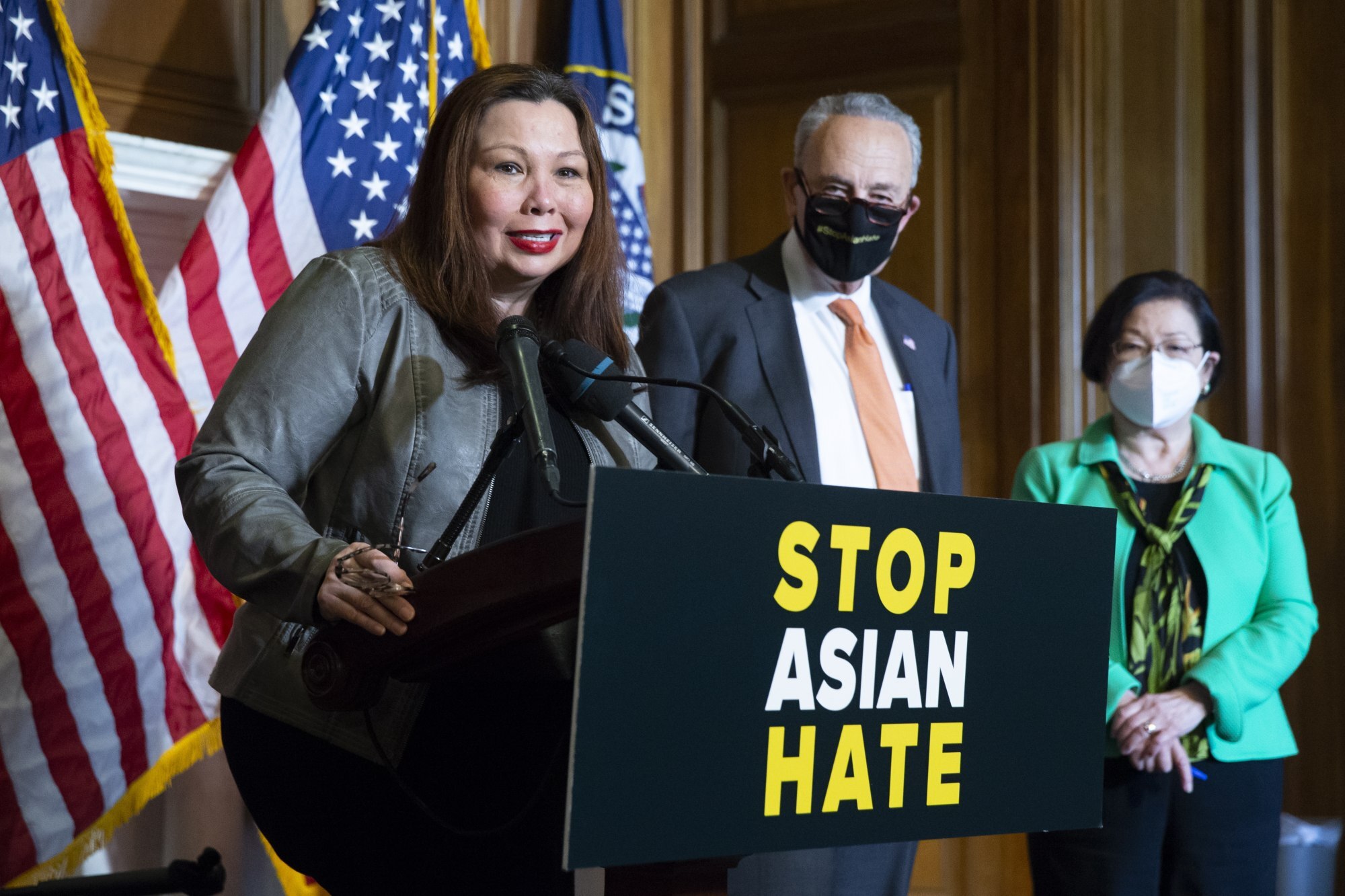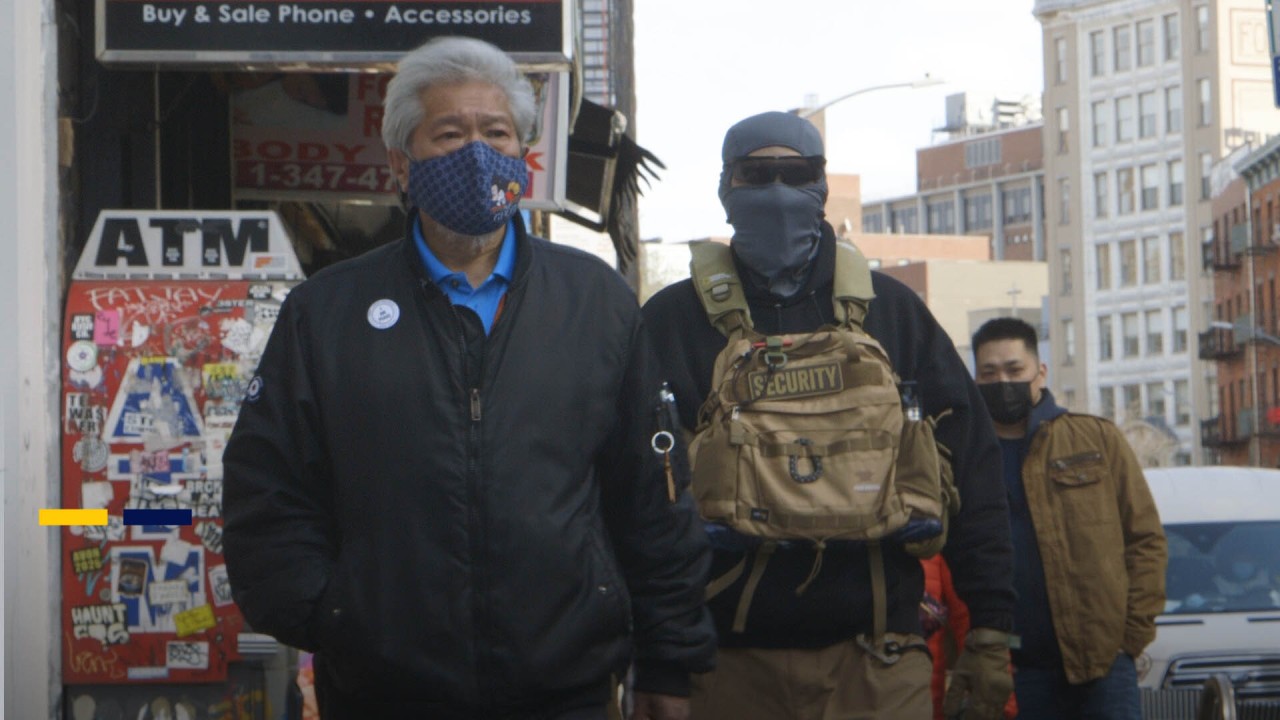
US Senate passes hate crimes bill after attacks on Asian-Americans
- Bill passes the US Senate, with broad support from both parties, by a vote of 94 to 1
- Republican Josh Hawley was the only senator to oppose the anti-hate crimes bill
The measure would expedite the review of hate crimes at the Justice Department and provide support for local law enforcement in response to thousands of reported violent incidents in the past year. Police have seen a noted uptick in such crimes, including the February death of an 84-year-old man who was pushed to the ground near his home in San Francisco, a young family that was injured in a Texas grocery store attack last year and the killing of six Asian women in shootings last month in Atlanta.
The names of the six women killed in Georgia are listed in the bill, which passed the Senate on a 94-1 vote. Biden applauded the measure, tweeting: “Acts of hate against Asian-Americans are wrong, un-American, and must stop”. The House was expected to consider similar legislation in the coming weeks.
Democratic Senator Mazie Hirono of Hawaii, the legislation’s lead sponsor, said the measure was incredibly important to Asian-Americans and Pacific Islanders, “who have often felt very invisible in our country, always seen as foreign, always seen as the other”. She said the message of the legislation was as important as its content and substance.
Hirono, the first Asian-American woman elected to the Senate, said the attacks are “a predictable and foreseeable consequence” of racist and inflammatory language that has been used against Asians during the pandemic, including slurs used by former president Donald Trump.
US Pacific Islanders highlight uniqueness amid anti-Asian hate pushback
Illinois Senator Tammy Duckworth, a former US Army helicopter pilot who lost her legs during a 2004 attack in Iraq, said she had been asked what country she was from while wearing her US military uniform. Duckworth, the first member of Congress born in Thailand, said there was more work to be done, but the bill’s passage tells the community that “we will stand with you and we will protect you”.
It’s unclear whether the bipartisan bill was a sign of things to come in the Senate, where Republicans and Democrats have fundamental differences and often struggle to work together. Under an agreement struck by Senate leaders at the start of the year, Republicans and Democrats pledged to at least try to debate bills and see if they could reach agreement through the legislative process. The hate crimes legislation is the first by-product of that agreement. Some said it doesn’t need to be the last.
Hirono said it is her “sincere hope that we can channel and sustain the bipartisan work done on this important piece of legislation” to a larger bill that would change policing laws, which Senate Republicans are negotiating with House Democrats. South Dakota Senator John Thune, the No 2 Republican, said ahead of the vote that he hoped the bipartisan example of the hate crimes bill would extend to an infrastructure package that has so far divided the parties.
The Chinese-American stepping up to take on hate crimes
Senate Majority Leader Chuck Schumer, a Democrat, said the legislation showed that the chamber could work in a bipartisan fashion, and he aimed to make that happen as much as possible. “That doesn’t mean we forgo our principles. It doesn’t mean we cut back on the boldness that is needed,” he said. “It means we try to work with our Republican colleagues wherever we can.”
But unlike many of the larger, more controversial policy issues Democrats hoped to tackle in their new majority, efforts to combat the rising violence against Asian-Americans and Pacific Islanders have almost universal backing. More than 3,000 incidents have been reported to Stop AAPI Hate, a California-based reporting centre for such crimes, and its partner advocacy groups since mid-March 2020.

Republicans said last week that they agreed with the premise of the legislation and signalled they were willing to back it with minor changes, an unusual sign of comity amid frequent standstills in the polarised Senate. Hirono worked closely with Republican Senator Susan Collins to incorporate some additional Republican and bipartisan provisions, including better reporting of hate crimes nationally and grant money for states to set up hate crime hotlines.
The revised bill would also replace language in the original legislation that called for “guidance describing best practices to mitigate racially discriminatory language in describing the Covid – 19 pandemic”. The legislation would instead require the government to issue guidance aimed at “raising awareness of hate crimes during the pandemic” to address some Republican Party concerns about policing speech.
Biden picks Erika Moritsugu as liaison to Asian community
Republicans agreed to back the compromise bill after the Senate also voted on and rejected a series of Republican amendments, including efforts to prevent discrimination against Asian-Americans in college admissions and reporting about restrictions on religious exercise during the pandemic.
Only one Republican, Missouri Senator Josh Hawley, voted against the bill. In a statement, Hawley said he believed the legislation was too broad, and “my view is it’s dangerous to simply give the federal government open-ended authority to define a whole new class of federal hate crime incidents”.
Democratic congresswoman Grace Meng introduced a similar bill in the House, which she said was expected to be considered in May.
“For more than a year, Asian-Americans all across our nation have been screaming out for help,” Meng said, and the Senate showed that “they heard our pleas”.
Additional reporting by Tribune News Service


